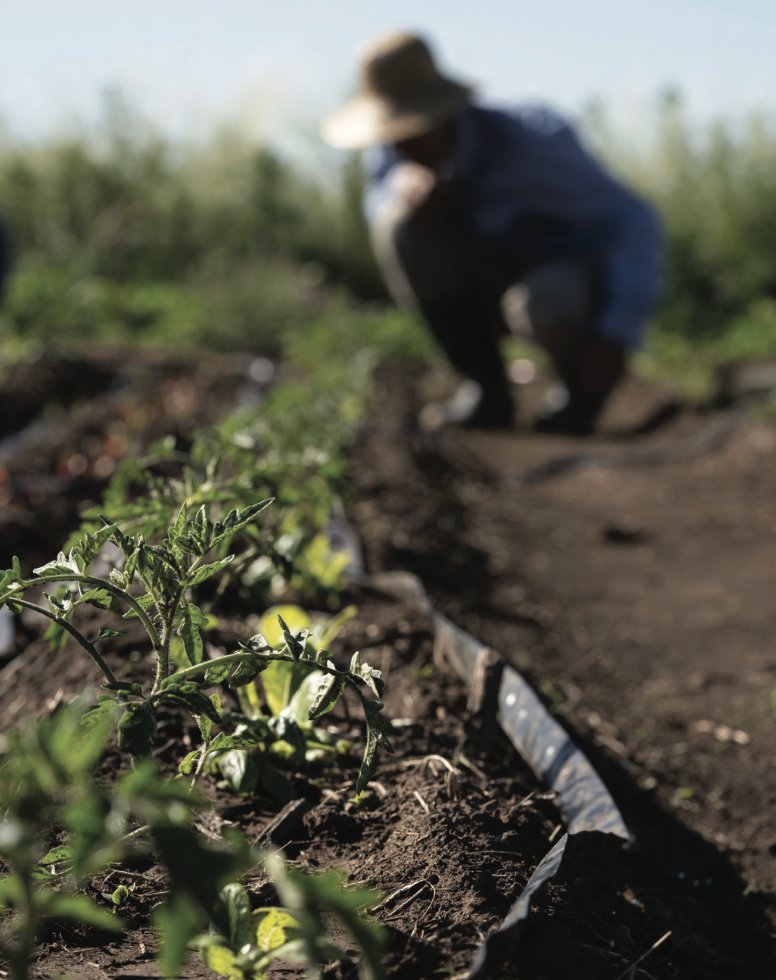When brands care as much about nourishing soil as they do your skin and hair, the industry is clearly breaking new ground. Here, we dig into the details.
Even if you’re not yet fluent in the principles of regenerative farming, they’ve probably been seeping into your consciousness like harvested rainwater into a field. (And yes, harvesting rainwater is one of them.)
Maybe you were shopping for Patagonia joggers or Citizens of Humanity jeans when you learned your selections were made from regeneratively farmed organic cotton. Or watching red carpet coverage of Woody Harrelson, Jason Momoa and Demi Moore as they discussed their involvement in Kiss the Ground and Common Ground—part of the regenerative farming documentary series that Amazon just acquired to much fanfare and will begin streaming this Earth Day.
Point is, regenerative farming has entered the discourse, whether through fashion, entertainment, or—increasingly—beauty. Indeed, several iconic skin and haircare brands (Davines, Éminence, and Artistry, to name a few) have been formulating with ever more regeneratively farmed ingredients.
But before we explore that corner of the beauty world, let’s review what regenerative agriculture actually is. While there’s no universally accepted definition, there is a common goal: to make the earth more productive, biodiverse, and resistant to climate change. And though the means to that end vary from farm to farm, they generally include: minimizing soil-disturbing practices (tilling, for one) to help keep complex subterranean systems intact; using cover crops to protect against the elements; maintaining living roots in the soil so that vital microorganisms stay well fed; rotating a diversity of crops to fight pests and disease; grazing animals to create naturally occurring fertilizer, and composting to further enrich soil. As for that rainwater harvesting? It tends to make the list in drought- and flood-prone regions.
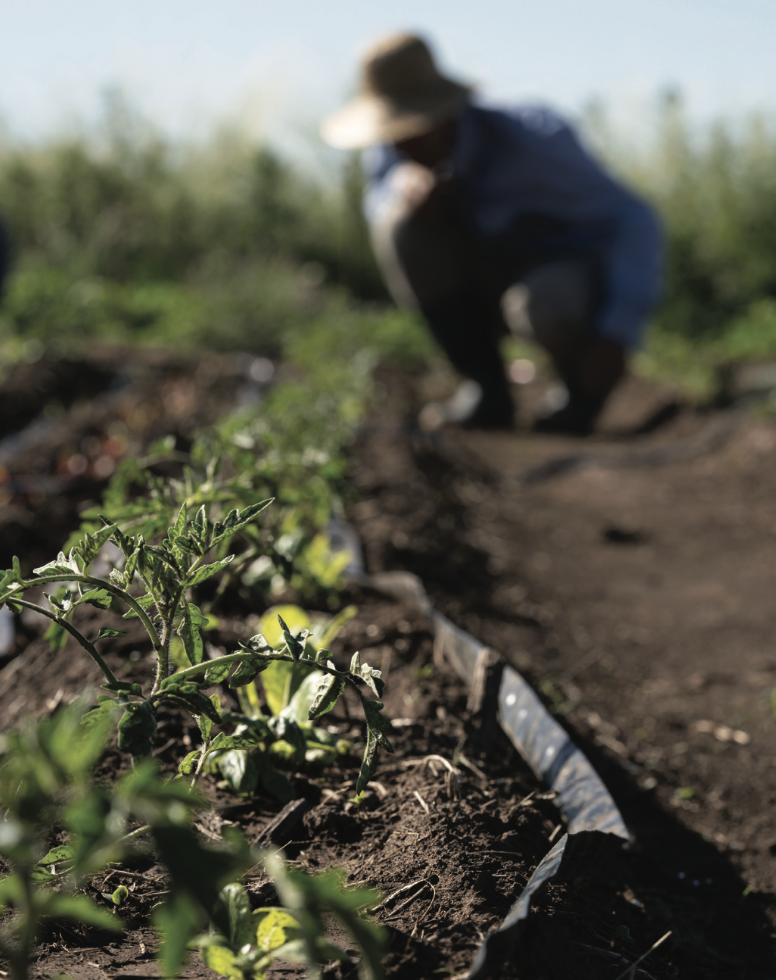
A LOOK BACK
There was a time in human history when the term “regenerative farming” would have been redundant. Farming was by definition regenerative in society after society that intuited the benefits of soil guardianship (there’s even a biblical commandment that every seventh year, “the land shall have a complete rest” from agriculture). Though the mid-20th century saw a wide-scale replacement of traditional farming by industrial agriculture, the wellness world began to see a resurgence of regenerative ideology shortly thereafter.
Éminence Organic Skin Care, for one, has adhered to a number of regenerative principles—from minimal tilling to cover crops—since the 1950s. In the intervening decades, studies and anecdotal evidence have shown that regenerative soil systems produce stronger, more nutrient-dense plants to formulate with. These include the lavender, evening primrose, and other organic crops that Éminence grows along a lush swath of Hungarian countryside between the Danube and Tisza rivers. The farm is open for free guided tours in the summer months, and though you can’t shop there, you can see where some of your favorite products hail from, such as the antioxidant-packed Stone Crop Masque. (The plant goes way back here: A medieval king is said to have granted local subjects a tax credit for growing stone crop on their roofs to protect against violent storms and witchcraft, but no mention of free radicals.)
Another organic beauty farm with longstanding regenerative practices—whether fortifying soil with nutrient-dense compost or harvesting water in rain barrels—is the one created by Tata Harper nearly 20 years ago in Vermont’s Champlain Valley, where she sources arnica, borage, calendula, and more for her cult-favorite concoctions. And last year, for the first time, she collaborated with a second regenerative operation: the food security-focused nonprofit Sky High Farm in New York’s Hudson Valley. The resulting product, Tata Harper Skincare x Sky High Farm Nourishing Hand Cream, helps fund access to fresh locally produced food.
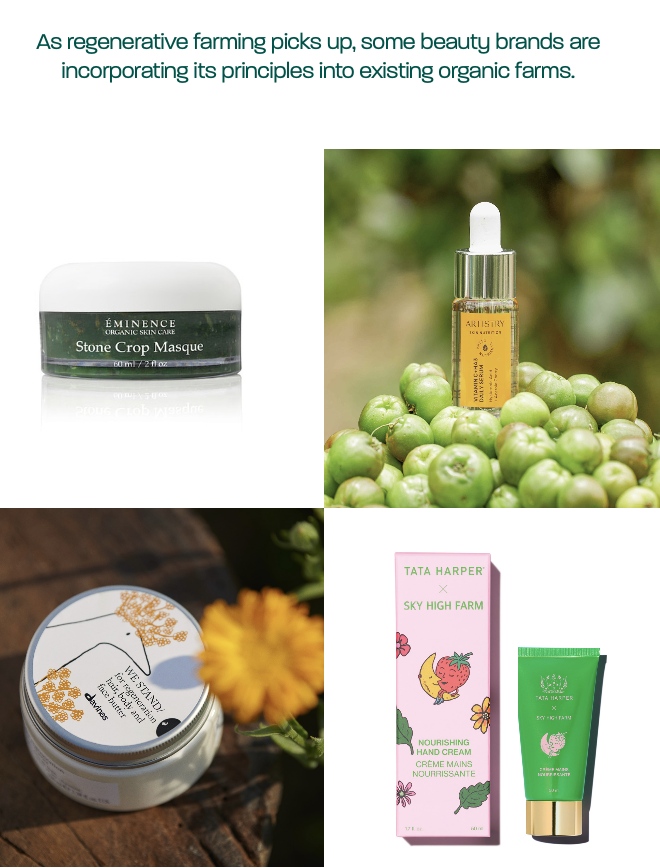
A LOOK FORWARD
As regenerative farming picks up, some beauty brands are incorporating its principles into existing organic farms. “All of our farms are already organic-certified and have been since their inception a few decades ago,” says Keith Eppers, director of global agribusiness operations for Amway (the parent company of Artistry Skincare, Makeup & Fragrance).
Now, as he thinks about “how to grow plants into the future that are high-quality and climate-resistant,” regenerative farming is the obvious choice. Take, for example, the acerola cherries that help fuel Artistry’s Skin Nutrition Vitamin C + HA3 Daily Serum, a crowd favorite. The Brazilian farm that grows those cherries “experienced a years-long drought that really impacted the soil health,” explains Eppers, “so we had to come up with creative ways to maintain our orchards.” That creativity—a blend of water conservation, soil nutrition, and organic pest control, among other measures—led to not only a more secure harvest, but also a new regenerative organic certification for the farm.
“Our goal within the next five years is to be Regenerative Organic Certified at the rest of our farm locations,” says Eppers. “We’ve got two farms in Washington, a farm in Mexico, and soon, a farm in China.” Lindsay Pott, Amway’s senior manager of marketing strategy, sustainability and transparency, notes that the company is helping hundreds of partner farms around the world work toward regenerative organic goals as well. If you want to visit some of these farms, at least virtually, try out the new Amway Tracing Tool at amway.respect-code.org. For each of the products you find there, “you can follow the journey of every single ingredient—where it’s sourced from, how it was grown, processed, all the way through to inclusion in that formula, into manufacturing, packaging and beyond,” she explains. So, if you click on that Vitamin C + HA3 Daily Serum, you’ll get to the Brazilian cherry orchards.
Another ingredient you’ll see in that serum, Mexico-grown white chia, is one of the brand’s rising stars—or “what some people call planet-saving ingredients,” says Pott. These are “not only incredibly nutrient-dense and good for different types of human health, but are also awesome for the planet because they’re resistant to climate change, to droughts, to extreme weather patterns and perhaps also have really high crop yields.”
A second beauty brand doing groundbreaking work with regenerative farming: The Davines Group, which includes Comfort Zone skincare and operates out of a bucolic Northern Italian campus just outside of Parma. One of the standout features of this village-like complex? The European Regenerative Organic Center, a first-of-its-kind research and education hub founded four years ago in partnership with the Rodale Institute, a famed pioneer in organic farming. “The idea was to create a lighthouse project,” says Simon Jackson, PhD, the Davines Group’s head of botanical research and resident pharmacognosist (an expert in naturally derived medicine). “We can replicate it in different countries around Europe, but also around the world.”
EROC, as the center is called for short, is hitting plenty of milestones in the interim. Last year, a Regenerative Organic Certified ingredient starred for the first time on the label of a beauty product: the limited-edition We Stand Hair & Body Wash Bar, featuring the center’s own white yarrow extract for gentle cleansing, softness, and hydration. And earlier this month, the Davines Group introduced We Stand/for Regeneration Hair, Body and Face Butter with EROC-grown calendula, shortly after debuting the first salon hair color—the Present Time line—that includes Regenerative Organic Certified coconut oil.
Who’s doing the certifying? The same organization that certified Amway’s Brazilian farm: the Regenerative Organic Alliance, which has quickly risen to prominence since its 2017 founding by— among others—soil health experts, farmers, and business leaders. Indeed, David Bronner, CEO of Dr. Bronner’s, was a founding board member. Not surprisingly, his family’s brand is going big on regenerative agriculture, and has just changed the labels on the iconic 18-in-1 Pure-Castile Magic Soap and All-One Pure-Castile Magic Bar Soap to highlight that both are now made with Regenerative Organic Certified oils. Not for nothing, Dr. Bronner’s widely adored All-One Chocolate bars are now Regenerative Organic Certified, too—and they’re so antioxidant-rich, we’re considering them honorary skincare products. They’re also some of the most convincing messengers for the CEO’s greater goal: “to see regenerative agriculture at global scale over time fulfill its promise as a key strategy to mitigate climate change, along with decarbonizing our global economy.”
“You can follow the journey of every single
ingredient—where it’s sourced from, how
it was grown, processed, all the way
through to inclusion in that formula, into
manufacturing, packaging and beyond.”
—Lindsay Pott, Amway’s senior manager of marketing strategy, sustainability, and transparency
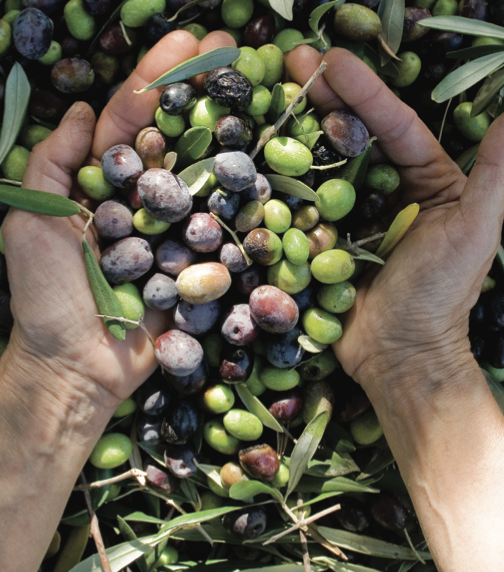
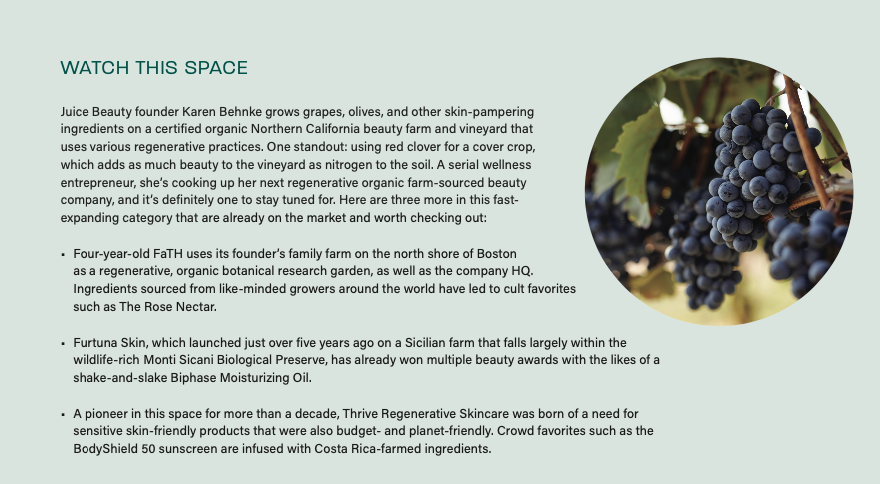
The post The Beauty Revolution Happening Beneath Your Feet appeared first on Organic Spa Magazine.

